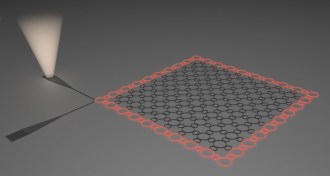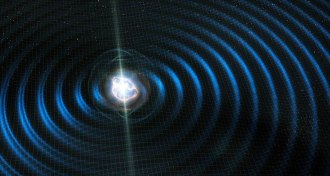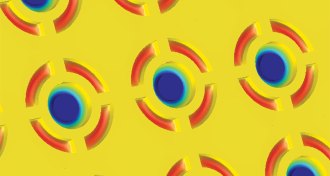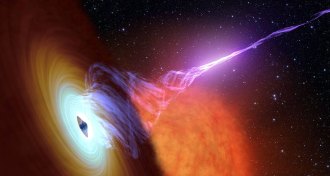Physics
Sign up for our newsletter
We summarize the week's scientific breakthroughs every Thursday.
-
 Materials Science
Materials ScienceSuperdense wood is lightweight, but strong as steel
New superdense wood could be a more lightweight, environmentally friendly alternative to current construction materials.
-
 Physics
PhysicsLaser experiment hints at weird in-between ice
Scientists spot signs of an unusual phase of water called superionic ice.
-
 Materials Science
Materials ScienceNew textile weathers temperature shift
Reversible textile keeps skin at a comfortable temperature with thin layers of carbon and copper.
-
 Tech
TechNew laser emits a more stable, energy-efficient light beam
A new type of laser could emit more stable, energy-efficient light beams than its conventional counterparts.
-
 Physics
PhysicsGravity doesn’t leak into large, hidden dimensions
Gravitational waves from a recently observed neutron star merger offer no evidence of large, unknown dimensions.
-
 Astronomy
AstronomyUniverses with no weak force might still have stars and life
An alternate universe that lacks one of the four fundamental forces might still have galaxies, stars, planets and perhaps life, a new study suggests.
-
 Particle Physics
Particle PhysicsClumps of dark matter could be lurking undetected in our galaxy
Dark matter, assumed to form featureless blobs, might clump together into smaller objects.
-
 Tech
TechLasers trace a new way to create hovering hologram-like images
Hovering 3-D images pave the way for futuristic displays that could be used for education or entertainment.
-
 Astronomy
AstronomyThe X-ray glow keeps growing after the recent neutron star collision
X-rays from a neutron star collision have been getting brighter, and scientists are debating why.
-
 Materials Science
Materials ScienceNew device can transmit underwater sound to air
A newly created metamaterial takes a shot at solving the problem of hearing underwater sounds from the surface.
By Dan Garisto -
 Astronomy
AstronomyMysterious high-energy particles could come from black hole jets
Three types of high-energy cosmic particles could all have the same source: black holes in galaxy clusters.
-
 Materials Science
Materials ScienceUltrathin 2-D metals get their own periodic table
A new atlas of atom-thick metals could help researchers figure out how these 2-D materials might be used.